Episodes
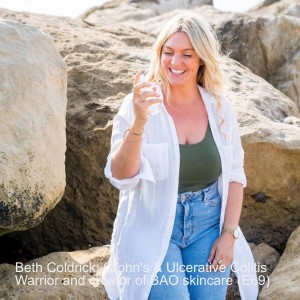
Monday Mar 21, 2022
Monday Mar 21, 2022
In today’s episode, Beth Coldrick shares her journey of living with Crohn's Disease and Ulcerative Colitis for the past 11 years. Over the last two years, she’s had four major surgeries and is now living with a stoma, raising awareness for Inflammatory Bowel Disease (IBD), and sharing her story and experiences to help others.
Although she struggled with symptoms for most of her life, it wasn’t until 2009 that she was finally diagnosed with both Crohn’s Disease and Ulcerative Colitis. Despite being on daily medications and high-strength steroids, she suffered for another 10 years until her surgery in 2019 when most of her large bowel was removed and she was fitted with a stoma.
During that time, as her IBD worsened over the years, Beth had to make major changes to her lifestyle that included moving back home when flares were at their worst and changing careers–using both her skills and passion to launch her own organic vegan skincare brand in 2018. Since then, and after her original surgery in 2019, she’s had three more surgeries and has had her life transformed, thriving with a permanent stoma.
* * *
Learn more about Beth and her skincare brand, BAO Making Skin Happy:
https://www.baoskincare.co.uk/
https://www.instagram.com/baoskincare/
https://www.instagram.com/happy_stoma_life/
Links to references in this episode:
Hannah Witton: https://www.youtube.com/hannahwitton/featured
Yoga with Adrian: https://www.youtube.com/c/yogawithadriene
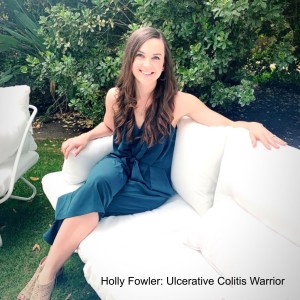
Monday Feb 28, 2022
Monday Feb 28, 2022
In today’s episode, Ulcerative Colitis Warrior Holly Fowler shares her story of living with Inflammatory Bowel Disease (IBD) for nearly 14 years. During that time, she’s been hospitalized more times than she can count (including once in a foreign country!) and–despite her diagnosis–has proceeded to have a career in corporate marketing, travel the world, run a marathon, and build her own business. She’s learned to put her health first and now shares her raw, unfiltered experience with IBD to help raise awareness and connect with others in the IBD community.
Holly is a certified health coach and the founder of Colitiscope Nutrition, where she offers health and lifestyle coaching for those ready to reclaim their lives and get back to doing what they love. She also offers numerous freebies on her website for those living with IBD, including a releasing shame workbook; 7-day workout guide; healing grocery list; and her masterclass, “7 ways to hack your health and make more money.”
**New program launch: Warriors Rising**
Specifically designed for women with Crohn's and Colitis, Holly is launching her new group program, Warriors Rising. This 12-week program will teach women practical ways to get into–and stay in–remission, learning about nutrition, fitness, mindset, stress management, and more.
https://colitiscopenutrition.com/warriors-rising/
Follow Holly online:
https://colitiscopenutrition.com/
https://www.youtube.com/c/HollyCampbellFowler/videos
https://www.instagram.com/hollsfowler/

Monday Feb 07, 2022
Monday Feb 07, 2022
In today’s episode, Lauren Cunningham–a Crohn’s Disease warrior, recipe developer, Integrative Nutrition Health Coach, and major foodie–shares her journey with Inflammatory Bowel Disease (IBD). She talks about how she turned her health struggles into her passion, healing herself from the inside out, and helping as many others along the way as she can. Lauren shares her journey with Crohn’s Disease–from surgery and total parenteral nutrition to being diagnosed with additional rare disorders–and how she balances her life now with IBD.
BONUS: Be sure to sign up for her mailing list on her website to receive her free recipe book for a low-residue diet.
https://laurencunningham.co/ Instagram @laur_cunningham | www.instagram.com/laur_cunningham

Sunday Oct 17, 2021
Sunday Oct 17, 2021
In today’s episode, Heather Hausenblas, PhD, shares her perspective and story as a mother of a son with Crohn’s Disease. Her son, Tommy, was diagnosed three years ago at the age of 16. Heather shares how she helped navigate his health and ultimately chronicled their journey in her new book, Invisible Illness: An Insider’s Guide to Eliminating Overwhelm and Rediscovering the Path to Health and Happiness with an Autoimmune Disease.
In this episode, she shares tips for parents who have children with IBD, cooking for a family, and journaling to track health and patterns. She is passionate about getting people talking about IBD and being more open to sharing their stories to help prevent others from suffering in silence for so long before seeking help.
Learn more about Heather and sign up for her weekly newsletters, including recipes and research, at:https://www.heatherhausenblas.com/
Purchase her book on Amazon at:https://www.amazon.com/dp/B09DR7VZS7

Monday Apr 05, 2021
Monday Apr 05, 2021
It’s been a while, but I’m back with another solocast episode of the podcast. I wanted to share a quick peek into what life has been like during the past year for me from working at home, my morning routine with Crohn’s, and balancing life and fitness with fatigue to my recent kidney biopsy. I plan to connect with more of my fellow IBD warriors and bring you all more podcast interviews to listen to, but until then, I hope you enjoy this quick solocast.
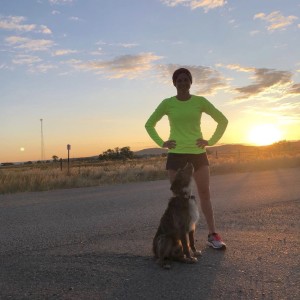
Wednesday Nov 25, 2020
Wednesday Nov 25, 2020
In today’s episode, Angela Spaulding shares her 16-year journey with Crohn’s Disease. Diagnosed in her early 20s, she spent many years angry–angry at the diagnosis, at the disease, at the world–and in denial. Like many others, she was forced to navigate the highs and lows of Inflammatory Bowel Disease and eventually found humor as a way to help shift her perspective.
Over the years, Angela quickly learned that stress is a major trigger for her Crohn’s flare ups. She was on and off medications for the first few years, but never wanted to stay on them long term. Though she did well for a few years and stayed in remission after stopping medications, in 2010 she found herself in the hospital and facing surgery.
In the hospital, the doctors found that her appendix was close to rupturing and scheduled her for an immediate appendectomy. The surgery went well, but she wasn’t recovering as expected. After a couple days in the hospital, she was taken back into surgery where the doctor found that a fistula had been connecting her colon to both her appendix and small intestine. When the doctor removed her appendix during the original surgery, he had unknowingly broken the connection to the fistula, which was allowing its contents to leak and make her sick. Having made a larger incision this time, the doctor found that 19” of her small intestine were badly diseased and removed it.
After surgery, the road to recovery was long. She had lost a lot of weight and all of her core strength. Describing her recovery process, Angela shared what it was like learning to eat without fear, how walking was the foundation for her recovery, and how discovering her love for running gave her strength. Running, she found, was not only a physical release for anxiety and stress, but also gave her a much needed mental break by giving her the time and space to clear her head.
Since 2011, she’s been off medications and she’s been in remission for the past couple of years. She’s learned to work with her body, navigate through mini flare ups, and find peace in the present moment. It’s taken time, but over the years she’s also learned to shift her mindset from being angry at everything to one of positivity. Though she admits that some days it felt like one step forward and two steps back, gradually her outlook shifted and she’s learned to focus on the good things in life while using humor to help her get through the difficulty of IBD. “We’re not always OK,” she said, but that’s what makes her more grateful for the times that she is.
Follow Angela on Instagram: @wanna.be.runner https://www.instagram.com/wanna.be.runner/
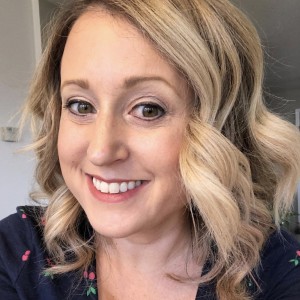
Thursday Nov 12, 2020
Thursday Nov 12, 2020
In today’s episode, 12-year Ulcerative Colitis Warrior Shelly Sulfrain shares her IBD journey and how an ileostomy gave her back her life. At the age of 29, Shelly was working as a pharmacist and enjoying life, having just finished school. Then, her first symptom of blood in her stool led her to a trip to the emergency room. It took a few more visits to her primary care doctor and eventually a gastroenterologist to finally diagnose Ulcerative Colitis. From there, she faced a number of highs and lows as she cycled through medications and faced life-threatening side effects throughout the course of her journey.
Over the years, Shelly found brief periods of remission, but ultimately kept finding herself back in a flare and struggling to keep the symptoms away. She battled one major flare right before her wedding and found remission on Imuran while she carried her baby. But, after delivering a healthy baby boy, she went into her worst flare yet and was started on Remicade. Four years later, she experienced a life-threatening side effect.
The brain fog she developed and difficulty in finding the right words were a result of her neurons not functioning properly; a rare side effect of Remicade. It also meant there was a chance that she might only have a few months to live. While an MRI confirmed that she was not facing death, the damage that had been done was not reversible.
Her options for medications were dwindling and, for Shelly, it was a sign that the disease was getting worse and that it was winning. She went on to try Entivyo, Humira, and Xeljanz, but nothing worked. By this point, she was in a bad place emotionally and mentally and she leaned into meditation, prayer, and journaling to help her cope with the anxiety, stress, and depression.
Finally, her doctor suggested surgery. While she dismissed the idea at first, after reaching out to a number of different ostomy advocates on Instagram, she was ready to consider it. She gave one last effort to exhaust all non-surgical options and sought the help of a functional medicine doctor. After she still couldn’t find relief, she was ready for surgery. Though she faced a number of complications after her first j-pouch surgery, a year later Shelly had an ileostomy and today is living life to the fullest. She’s gained a lot of insight over the years and although times may get tough and bleak, she recognizes that having a positive outlook is vital and encourages others to remember that they are not alone.
Follow Shelly on Instagram at:https://www.instagram.com/shellsgotguts/@shellsgotguts
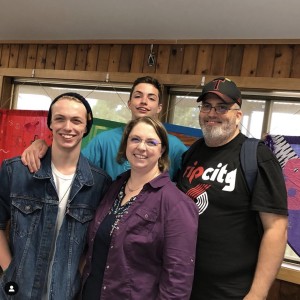
Monday Nov 02, 2020
Monday Nov 02, 2020
In today’s episode, Logan Crumrine, a Crohn’s Warrior for nearly 30 years, joins me for an open and honest conversation about the disability process. Logan shares his experience of filing for disability due to Crohn’s Disease, shedding light on the entire process and answering many questions submitted by our listeners.
Logan’s IBD journey began 30 years ago as a teenager. But, after his initial flare and diagnosis, he went almost 20 years without a flare up and stayed in remission. Eight years ago, however, things changed and it was the start of an ongoing flare that eventually led him to file for and receive disability. You can hear Logan’s full story in episode 29 or listen directly here (update: Logan was declared to be in clinical remission this past June 🙌).
In 2012, Logan’s Crohn’s Disease had progressed so quickly, he had to quit work and in 2013 he and his wife began the journey of filing for disability. The first step: going to the Social Security Administration’s (SSA) website to file (https://www.ssa.gov/benefits/disability/). Then, as Logan describes it, you wait. This is probably the mentally toughest part of the process as the wait is not short. It took five months for Logan to receive a decision after filing, which turned out to be a rejection letter. Unable to work and describing himself as barely existing by this point, Logan’s thought was, “how sick do I need to be?”
The next step, after receiving the initial rejection, was to file an appeal with the SSA. But, unfortunately for Logan, the appeal resulted in another rejection letter that came almost six months later. Looking back on his journey with the perspective of having gone through it, Logan shared that he didn’t handle the waiting and stress very well, especially after having spent the previous 20 years in remission. He was hit with depression and his wife and sons, in addition to faith, helped him get through. If he had to go through it again, he said, and for anyone else facing the same situation, he shared that he would seek counseling at the onset to have a connection point and to better understand what he was experiencing.
The final step in seeking disability, for Logan, was to appeal to an administrative law judge. Logan explains that with the SSA, you basically have two chances to receive disability: the initial filing and the appeal. After that, you have to appear before an administrative law judge; this is the final course of action to continue in the process after receiving both rejections from the SSA. This is when Logan chose to hire a lawyer to help him through the process of appearing before a judge.
The first few months after hiring a lawyer was focused on data collection, including medical records, work history, and character information. It was a process that Logan described as invasive! Finally, once all the information was collected, it went into a case file that was given to the judge. And once again, there was a lot waiting before receiving a hearing date to appear in front of the judge at the federal courthouse.
On the day of the hearing, there were two people in the room with Logan: the judge and a vocational expert. In a disability case, after hearing all the testimony and evidence, the judge relies upon the vocational expert to simply state yes or no as to whether the person (Logan, in this case) is capable of holding a job, for any amount of time, in the American economy. For Logan, the answer was no. While it was the answer he sought, he also described what a punch in the gut it was to face the reality that this expert, in front of the judge, was declaring that he was not capable of holding any job in the condition he was in.
After the hearing, in 2015, there was one more round of waiting before receiving the official ruling. The letter came for Logan about two months later and he was declared disabled, back dated to the time of his initial filing in 2013.
Logan was gracious to share his own journey in this process and as we dive deeper in the actual interview, Logan answers a variety of questions including:
Should I get a lawyer to help with this process?
Which doctor should fill out my disability form?
Can you be on unemployment while waiting for disability?
Do you have to have had multiple surgeries?
When on disability, do you/can you still work and earn some kind income?
Today, Logan is working on building up his health and strength while he is in remission. He focuses on helping around the house and on his two sons, especially with school work during this time of COVID. He and his wife focus on making sure and reminding themselves that every day matters and nothing is taken for granted.
If you have any questions you’d like Logan to answer about the disability process that we didn’t cover here, or any IBD questions in general, he’s willing and eager to share his knowledge. You can send him a direct message and follow him on Instagram at @thecrohniedad.
In closing the interview, Logan reminds everyone that “even though you have a chronic illness, the chronic illness is not you.”

Monday Oct 12, 2020
Monday Oct 12, 2020
In today’s Crohn’s Fitness Food podcast interview, Raina O’Dell shares her journey with Ulcerative Colitis, talks about the growth and transformation in her life from @rainavsfood to @its.just.raina, and how she’s been able to stay positive – always searching for the silver lining.
While Raina struggled with symptoms for about a year before diagnosis, she found herself pushing through and just attributing the symptoms to either nutrition or stress. Finally, in the early part of 2016, she started searching for a doctor who could give her answers and eventually found one who performed a colonoscopy. She immediately came away with a diagnosis of Ulcerative Colitis, medication, and no knowledge of what IBD was.
After returning home from the hospital, she poured over research and learned as much as she could about what was happening with her body. Drawing upon her background and experience as a health and fitness coach, she was determined to help her body heal without the use of medications. She refocused her efforts in diet and exercise, using the tools and knowledge she had, and succeeded in achieving remission by October of that year – just over six months after being diagnosed. She stuck to the foods that made her feel good (“eat good, feel good” was her mindset), cut out inflammatory foods, and took the same approach with fitness.
But remission didn’t last and the stress in her life wreaked havoc on her IBD. Her previous efforts of diet and fitness were not enough to overcome the stress and flare up this time. Her IBD journey escalated quickly and in February of 2017, she was in the hospital. A few months later in May, she had a total colectomy and temporary ileostomy. In July, she went in for the j-pouch surgery, but knew immediately it wasn’t working. Despite knowing what her body was telling her, she left the hospital that summer and was back in February of 2018 with abscesses on her j-pouch and an infection. The next step was a permanent ileostomy.
But two and a half years later, she’s more vibrant, healthier than ever, and thriving. She’s spent the last few years focusing on reducing stress, becoming more mindful, and using movement and nutrition to intentionally care for her body and become her best self. Both meditation and mindfulness help to reduce the noise in life and allow her to take a breath and slow down. During her flare ups and surgeries, she took the time to listen to her body and allowed it two full years to heal, unable to even do yoga as she battled fatigue. Fast forward to today and there’s nothing she can’t do now. With the green light from her doctor to workout again after her last surgery, she slowly and steadily built up her strength and she loved every aspect of getting back into fitness. From bodyweight workouts and lifting to fitness bands and yoga, you won’t find her skipping a day of movement now!
Today, she finds the silver lining in being able to serve as an inspiration to others. Her journey has made her stronger and being able to help just one person to feel better keeps her motivated to do more, share more, and enjoy life more. To everyone out there with an ostomy, IBD, or anything else that might currently be holding them back, she dares you to talk about it and to search for the silver lining in every single day.
@its.just.raina@letsputtheradinradicalhttps://www.instagram.com/its.just.raina/https://www.instagram.com/letsputtheradinradical/
Want to get the shorts she wears when working out:https://honeyathletica.com/Use code: raina10
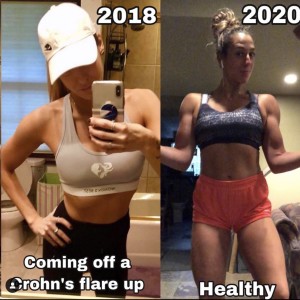
Monday Sep 28, 2020
Monday Sep 28, 2020
In today’s episode, Angie Venetos shares her Crohn’s Disease journey and how it’s impacted not just the way she views IBD, but life overall. From learning to adapt her workouts by listening to her body, to seeing how strong her support network is from the love of her family and friends, she’s rewriting the story of Crohn’s Disease in her life and is working to share a message of hope, compassion, and awareness.
Angie’s first signs of inflammation in her body, and the onset of Crohn’s, was in late 2017 when she developed psoriasis for the first time in her life and later severe joint pain. That November, she started experiencing more stomach issues and seeing blood when going to the bathroom. With her dad being a gastroenterologist, she was able to quickly get a scope, and in December, she was diagnosed with Crohn’s.
After the diagnosis, she was started on medications and tried to resume her life. Things were going well, but a stressful 2018 resulted in a major flare up that hospitalized her for a month. It was during her stay in the hospital that she realized how deep and strong her support network was. The support and love her family and friends showed her, in addition to her faith, helped her get through the pain and physical disability of it.
Shortly after that, Angie began sharing her experiences and raising awareness for Crohn’s on her Instagram. Prior to Crohn’s, she posted about fitness and her love of weight lifting. But she found herself retreating from social media for a few months during and after her hospital stay. When she was ready to post again, she felt compelled to explain the silence and her 20 pound weight loss that occurred in just a few weeks. Since then, she’s been sharing her IBD journey alongside her fitness journey.
Throughout her time since diagnosis, she’s learned that stress is a major trigger for her and she’s learned the importance of balance and its role in keeping her in remission. Whether it’s working out too much/too hard, focusing too much on work, or overdoing any other part of her life, she knows stress will trigger a flare up. She’s learning to trust herself and listen to her body, knowing when she needs to slow down and honoring that. Having a support system is also beneficial in helping her to slow down. She credits her boyfriend for not being shy about letting her know when she’s working out too much or focusing too hard on work and reminds her to rest!
Though she’s still learning what foods work best for her, she has found that plant-based proteins and plant-based protein supplements make her feel less bloated and gives her energy before working out. She incorporates a variety of supplements in her diet on a daily basis, including Apple Cider Vinegar, collagen, a multi-vitamin, turmeric, gynostemma and milk thistle; when she’s going through a flare up, she incorporates bone broth smoothies.
With fitness being a major part of her lifestyle, she’s had to learn to adapt and be flexible in her schedule. Her weekly routine will usually include weight lifting, running/walking, and yoga, but she’s learned that she now needs 1-2 days off each week. She’s also found that sticking to bodyweight exercises in the morning works well for her and by taking a nap early in the evening after work, she can then get to the gym with lots of energy and have a good lifting session. Angie’s willingness to adapt to the challenges that Crohn’s has given her has helped her to learn to work with her body and not against it. Although Angie makes finding balance and listening to her body look easy, she admits that it’s actually been one of her biggest challenges since being diagnosed – learning to listen to her body and not her head.
In addition to finding and constantly working to achieve balance, she’s had to learn to deal with the emotional stress that comes with IBD. Not knowing what the future holds, but knowing what the potential outcomes may be, causes anxiety that, if not kept in check, can lead to flare ups. It’s taken a shift in mindset to focus on the present moment, to take a step back to simply ask, “am I OK right now.” She uses prayer daily and makes a gratitude list each evening to help put herself at ease.
Having IBD has changed her view on a lot of things in life and has allowed her to become kinder and more compassionate and empathetic about what other people are dealing with in their own lives. But, above all, having IBD has made her want to help others who are going through the same thing. She’s driven to be a voice for those who are afraid to speak up and in sharing her own journey, she hopes that someone else may benefit from it.
Follow Angie on Instagram at: @angie.m.vee







